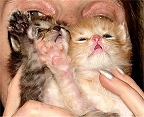Chocolate, fruit and nuts may sound like tasty delights to you, but these foods can be downright deadly to our four-legged friends. In 2008, the ASPCA handled 140,000 animal poison related emergencies. It's often pet owners who unwittingly poison their pets by giving them foods and drinks they can't tolerate. To help you protect your furry friends, we tapped Fiona Fisher, D.V.M, veterinary expert at JustAnswer.com, who practices in Ontario, for her roundup of common household foods and items that pose a threat to your beloved pets. Avoid these common toxins to keep your dogs and cats live long, healthy lives.
Grapes and Raisins
Healthy for you? Yes. Healthy for pets? No. In dogs and cats, grapes can cause kidney failure. "We're not exactly sure why grapes pose a health hazard to pets," says Fisher, but experts suspect it has something to do with a chemical in the fruit's skin. Raisins are even more dangerous because they contain a concentrated supply of toxins. Keep this snack out of the reach of your pets.
Bread Dough
"I see this one a lot when people make bread, leave it to rise, and come back to find their dog has helped himself to a serving," Fisher says. What's the harm? The dog's body heat will cause the dough to expand quickly resulting in severe abdominal pain and bloating. In some cases, death can occur if enough dough is eaten.
Chewing Gum
A dog might be attracted to the sweet-smelling gum that your kids are chewing or that's tucked away in your bag. But the artificial sweetener, xylitol, in many types of gum and breath mints, can be deadly to pets. The sweetener can cause a low-blood sugar crisis in your pet. In fact, just one pack of gum can kill a dog, warns Fisher.
Macadamia Nuts
Careful where you keep that bowl of mixed nuts. If they're on a low table that your dog can reach, your pup might get into trouble. Ingesting these nuts can cause tremors, weakness, unsteadiness, depression, a rapid heart rate, and a dangerous rise in body temperature that can lead to other complications. Though macadamia nut toxicity is very scary and dangerous, most dogs recover within a few days, says Fisher.
Nicotine
It may seem unlikely that a dog would eat cigarettes, but those nosy, little creatures will gobble them without a second thought. Nicotine is highly toxic so it doesn't take much to cause a health crisis for your pet, including seizures, coma and death.
Chocolate
Who doesn't find chocolate irresistible? But when it comes to dogs, chocolate is one deadly treat. Caffeine-like stimulants in chocolate known as methylxanthines can produce vomiting, diarrhea, excessive thirst and urination, hyperactivity, abnormal heart rhythm, tremors, seizures and even death, cautions Fisher.
Alcohol
"This type of poisoning happens a lot after people throw a party and their dog or cat gets into a glass alcohol sitting around or that's spilled on the floor. Sometimes, children will think it's funny to give a dog some beer," Fisher says. And while animals may experience some of the same wobbliness and weakness that humans do after drinking, they are much more sensitive to alcohol than humans and can quickly be in a life-threatening situation, she says. Alcohol ingestion can lead to seizures, heart arythmia, vomiting, coma and death.
Pain Relievers
According to Veterinary Pet Insurance (VPI), the number one insurance claim by far for poisonings in 2007 was owner-induced. In most cases, the problems were caused by pet owners giving their pets drugs intended for human use. "Sometimes when the vet's office is closed and a pet is in pain, people will administer over-the-counter pain relievers like iburprofen or acetaminophen to their dogs," Fisher says. Never give your pets these types of drugs, warns Fisher. One tablet of acetaminophen can kill a cat, she says.
Tea
Ever had your cat poke its head into your cup of tea? It's not just annoying, it can be downright dangerous depending on the type of tea you're drinking. Caffeine in your tea is toxic to both cats and dogs. Depending on how much is consumed and the size of your pet, ingesting it can lead to vomiting, diarrhea, hyperactivity, seizures, coma and even death.
Onions
You'd probably never consider giving your dog a piece of an onion, but if you toss her a piece of steak or a bit of stir fry cooked with onions, you're putting your dog in danger. Onions are toxic to dogs and cats whether they're raw or cooked. When ingested, onions can cause hemolytic anemia, a condition that destroys the red blood cells in the bloodstream. A dog with onion poisoning may become lethargic and have difficulty breathing. Generally, a large amount of onions would need to be consumed to pose a serious threat to your dog, but cats are highly sensitive to onion toxicity.

